| Russo-Georgian War |
|---|
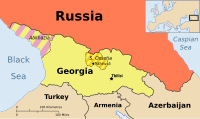 |
| Main topics |
| Related topics |
| |
The Russo-Georgian War caused major infrastructural and economic damage throughout Georgian and South Ossetian territory. Many countries promised reconstruction aid to the affected regions.
| Russo-Georgian War |
|---|
 |
| Main topics |
| Related topics |
| |
The Russo-Georgian War caused major infrastructural and economic damage throughout Georgian and South Ossetian territory. Many countries promised reconstruction aid to the affected regions.
On 19 August 2008, Armenia and Azerbaijan sent construction materials and specialists to Georgia to help in the reconstruction of the railway bridge in Kaspi Municipality blown up on 16 August 2008. [1]
Georgia's war damage was assessed to be $3 billion by the international commission. A donors' conference for Georgia was scheduled to be held on October 22. [2] [3] On 20 October 2008, on the sidelines of an international high level conference in Belgium on "The Future of Parliamentary Involvement in Global Health and Development", the humanitarian situation in Georgia was also discussed. [4] On 22 October 2008, the United States pledged $1 billion economic support package at a EU-organised donors’ conference in Brussels; this came after earlier aid of nearly $40 million in emergency humanitarian assistance. [5] The European Commission added another €500 million. Many nations did not disclose their actual pledges. According to diplomats, Germany had promised additional €33.7 million in addition to their pre-war promise of €35 million. Sweden offered €40 million. France promised €7 million. [6] Japanese offer of $200 million in infrastructure recovery aid over three years included the condition of Georgia's continuation of democratic and economic reforms. The International Monetary Fund pledged a $750 million credit. The European Investment Bank pledged €200 million reconstruction credit. [5] Estonia pledged €1 million. [7]
In total, the Brussels conference agreed to provide $4.55 billion for Georgia from 67 entities. [5] The amount far exceeded the $3.25 billion estimate of the World Bank and United Nations. [5] Of the total, $2 billion would be awarded as a gift and most of the money would be put into the private sector. [6]
Georgian Prime Minister Lado Gurgenidze said, "We are deeply moved and humbled by the demonstration of solidarity and support that we have received." He observed the pledges were issued despite the ongoing effects of a global financial crisis. He then added that "Every single, euro, dollar and pound will make Georgia stronger, more prosperous, freer, more democratic and more genuinely and thoroughly European." Joint summit host, EU External Affairs Commissioner Benita Ferrero-Waldner, said of the occasion and its outcome, "This is a day of joy." The pledge came after growth forecasts for Georgia's economy were reduced from 9 percent to 3.5 percent with 127,000 newly displaced people resulting from the conflict. [6]
The World Bank official suggested in early December 2008 that if the donors' conference had been held later than October 2008, there was no guarantee that Georgia would have received any aid. Georgia was spared from the 2007–2008 financial crisis as a result of the financial aid. [8]


On 12 August 2008, the Government of Moscow announced they were planning to spend 2.5 billion rubles for the construction of Moskovsky mikrorayon (Moscow's micro-district) in South Ossetia, which would house up to 4 thousand residents. [9] The Russian Ministry of Emergency Situations announced on 29 August 2008 that all 6 schools in Tskhinvali had been restored and new school year would begin on 1 September 2008. [10]
In September 2008, hundreds of workers for the reconstruction of Tskhinvali were deployed by Russia. [11] South Ossetian Prime Minister Boris Chochiev said that Russia "promised to pay South Ossetians up to $2,000 each in compensation for war damage." [11] In September 2008, Russia financed payment of pensions for South Ossetian pensioners, financed aid for unemployed and subsidised families that lost their houses during the war. [12] Russian reconstruction aid for South Ossetia was $490 million. However, there were serious concerns about the effectiveness of the distribution of Russian aid by South Ossetian authorities. [13] In December 2008, President Eduard Kokoity said that there were irregularities in the reconstruction process, such as the artificially ballooned prices and fraud. [14] [15] However, the contractors were surprised by Kokoity's allegations of inflated prices. Russian Emergencies Minister Sergey Shoigu was ordered by Russian president Dmitry Medvedev to help to fix "the state mechanism" of South Ossetia against the backdrop of this scandal. [16] In late December, Kokoity accused the Russian newspaper Kommersant of publishing falsehoods about him. [17]
In March 2009, the Russian Finance Ministry received an order from Prime Minister Vladimir Putin to prepare an agreement on financial aid to Abkhazia and South Ossetia. [18] Russia would allocate 8.5 billion rubles to South Ossetia for the reconstruction in 2009 only after South Ossetia would agree to the Russian monitoring of spending. [19] South Ossetian information minister Irina Gagloeva told Vedomosti newspaper that all reconstruction work was practically halted. South Ossetian finance minister Inal Pukhaev said that South Ossetia had completely spent 1.5 billion Russian rubles received in 2008 on the reconstruction. However, there were complaints of poor quality. [20] On 16 March 2009, Kommersant newspaper reported that the meeting of the commission on financing of South Ossetia of the Russian Ministry of Regional Development was postponed for the fourth time. The reporter stated that South Ossetia looked almost the same as during the war 7 months before. There never had been any reconstruction work in the villages at all. [21] The Russian Finance Ministry allocated 2.8 billion rubles from the Russian federal budget to South Ossetia on 17 March 2009. [22]
Vadim Brovtsev was appointed as Prime Minister of South Ossetia in August 2009 to control the spending of the Russian financial aid for the reconstruction. [23] Kommersant reported that Tskhinvali looked almost the same on the anniversary of the war as 1 year before and no construction had been finished. The office of one of contractors had been robbed several days before and the victims were advised by the South Ossetian police to forget about money and leave South Ossetia altogether. Several Tskhinvali residents were quoted as saying that the visit of President Medvedev in July 2009 had jumpstarted the construction process and the foundations for the buildings were built in 3 weeks. [24] Head physician of the Tskhinvali City hospital told Alexander Kots (journalist) that the recent visit of the Russian-appointed new Prime Minister was the first time in an year that a government official had visited the hospital and this gave him hope that the hospital would be reconstructed. [25] On 30 September 2009, 150 Tskhinvali residents held an unsanctioned rally demanding the reconstruction of their damaged residential houses. [26] On 1 October 2009, South Ossetian residents sent a letter to Medvedev and Putin. They complained about the slow pace of the reconstruction and embezzlement of the Russian financial aid. [27] [28] Kommersant reported in December 2009 that only 100 buildings out of 3500 damaged had been restored in South Ossetia and the Russian money had ran out. Russia was no longer going to grant new financial aid for the reconstruction. [29]
In August 2010, Eduard Kokoity accused "pro-Georgian forces" in Moscow for sabotaging the reconstruction of South Ossetia. [30] In October 2010, Prime Minister of South Ossetia Vadim Brovtsev inspected the construction sites. He was disappointed by the slow pace of the construction of the municipal housing. [31] Kommersant reported in March 2011 that although the Russian and South Ossetian authorities had claimed that South Ossetia's reconstruction was finished, not all damaged houses had been repaired and many victims living in poor conditions were dying in wait for the houses. [32]
In October 2011, Russian journalist Arkady Babchenko reported that one of the reasons behind a sharp fall in the approval rating of President Eduard Kokoity was the disappearance of Russian aid money. [33]
In 2013, the Russian Prosecutor General's Office opened 60 criminal cases of embezzlement of billions of Rubles in South Ossetia. [34]
The Dzuarikau–Tskhinvali gas pipeline from North Ossetia to Tskhinvali began operation on 26 August 2009. The new pipeline was reported to have cost 15 billion rubles (US$476 million) and was under construction since December 2006. Before the construction, South Ossetia was supplied by gas from Georgia proper through the Agara-Tskhinvali branch of the Tbilisi-Kutaisi trunk system. [35] Dzuarikau-Tskhinvali gas pipeline is among the highest-altitude pipelines in the world. [36]
In Russia, the aid - and the perceived lack of similar attention given to cities in Russia - inspired the meme and idiom "to bomb Voronezh", with Russians sarcastically suggesting that their cities be bombed as well so their regions could receive as much money as South Ossetia. [37]

South Ossetia, officially the Republic of South Ossetia or the State of Alania, is a partially recognised landlocked state in the South Caucasus. It has an officially stated population of just over 56,500 people (2022), who live in an area of 3,900 square kilometres (1,500 sq mi), with 33,000 living in the capital city, Tskhinvali.

Eduard Dzhabeyevich Kokoyty is an Ossetian politician who served as the second president of South Ossetia of the partially recognized state of South Ossetia from 2001 to 2011.

Tskhinvali or Tskhinval is the capital of the disputed de facto independent Republic of South Ossetia, internationally considered part of Shida Kartli, Georgia .Tskhinvali Region, known historically as Samachablo, was always part of the Georgian state as a single military and administrative entity. It is located on the Great Liakhvi River approximately 100 kilometres (62 mi) northwest of the Georgian capital Tbilisi.

The Georgian–Ossetian conflict is an ethno-political conflict over Georgia's former autonomous region of South Ossetia, which evolved in 1989 and developed into a war. Despite a declared ceasefire and numerous peace efforts, the conflict remained unresolved. In August 2008, military tensions and clashes between Georgia and South Ossetian separatists erupted into the Russo-Georgian War. Since then, South Ossetia has been under Russian occupation.

The Communist Party of South Ossetia is a communist party in South Ossetia. The party was founded in 1993. As of 2004, the party claimed a membership of 1,500. The party seeks recognition of the Republic of South Ossetia, which is internationally recognized by most countries as a part of Georgia.

The People of South Ossetia for Peace movement was the opposition party and political movement in South Ossetia which was formed by the ethnic Ossetians who had been formerly members of the secessionist government in Tskhinvali and outspoken critics of de facto separatist regime in Tskhinvali, headed at that time by Eduard Kokoity.

This article documents the aid given by several countries to the people who suffered due to the Russo-Georgian War.
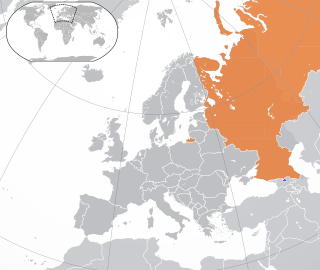
Russia–South Ossetia relations refers to the bilateral relationship between Russia and the Republic of South Ossetia, a disputed region in the South Caucasus, located on the territory of the South Ossetian Autonomous Oblast within the former Georgian Soviet Socialist Republic.

The Armed Forces of South Ossetia is the military of the partially recognised state of South Ossetia. It includes an Army and an Air Corps.

Abkhazia–South Ossetia relations are bilateral foreign relations between the Republic of Abkhazia and the Republic of South Ossetia, whose international status is disputed – they are both considered part of Georgia by the majority of the world's states.

The Government of the Republic of South Ossetia is the political leadership of the partially recognised Republic of South Ossetia.
Alan Parastaev is an ethnic Ossetian jurist and politician who had served in the separatist government of South Ossetia from 1992 to 2005. He was arrested by the South Ossetian authorities in 2006, but escaped to the Georgian-controlled territory in 2008. Since then Parastaev has worked in the government of Georgia.
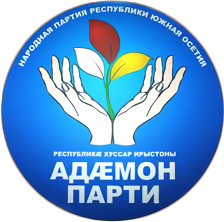
The People's Party of South Ossetia is a social liberal political party in South Ossetia, a partially recognized Caucasian republic, considered by most countries to be a part of Georgia. The party is known for being staunch supporters of former president Eduard Kokoity.

Presidential elections were held in South Ossetia on 13 November 2011. A referendum was held on the same day. A run-off was held on 27 November, but the result were invalidated by the Supreme Court of South Ossetia. A new election was scheduled for 25 March 2012.

Alla Aleksandrovna Dzhioyeva is a South Ossetian teacher turned politician, who is currently Deputy Prime Minister in the South Ossetian government. She previously served as the Education Minister in 2002–2008. She won the 2011 presidential election, but the Supreme Court annulled the results, alleging that electoral fraud had been committed.
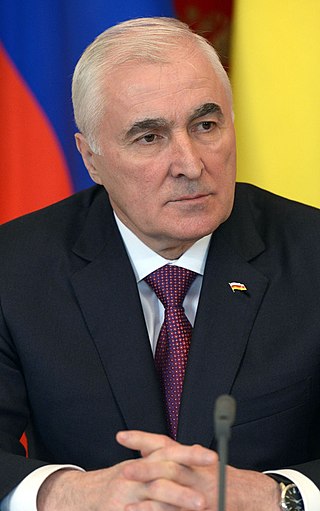
Leonid Kharitonovich Tibilov is a South Ossetian politician who served as the third president of South Ossetia from 2012 to 2017 after winning the 2012 South Ossetian presidential election.
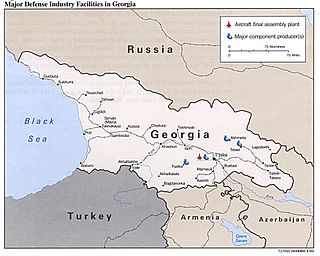
Some Infrastructure damage during the Russo-Georgian War took place.

Independence Day or Republic Day is the main state holiday in the partially recognized Republic of South Ossetia. This date is celebrated on September 20. It commemorates South Ossetia's declaration of independence from the Georgian SSR in 1990, and the country's recognition as a sovereign state by Russia in 2008.

The 4th Guards Military Base is a sizable overseas military base of the Russian Armed Forces stationed in the disputed territory of South Ossetia. Russia considers South Ossetia to be an independent state and justifies its military deployment in the area by an intergovernmental agreement, while Georgia considers the entity as its territory occupied by Russia.

Presidential elections were held in the disputed territory of South Ossetia on 10 April 2022. As none of the presidential nominees obtained at least 50% of the votes, a runoff was held on 8 May 2022, between the top two candidates, Alan Gagloev and incumbent president Anatoly Bibilov.